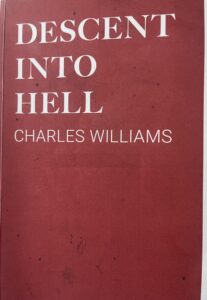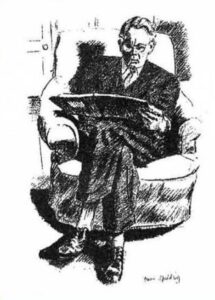 The 1937 novel Descent into Hell, by Charles Williams, has a magnificent title, but was torture to read. I would describe the writer’s narrative style as relentlessly choppy: it is loaded with long, complex sentences riddled with abrupt and awkwardly placed clauses which made his thoughts hard to follow and his meaning obscure. And this describes his straight narrative style; occasionally he takes off on lyrical flights of fancy which are irritatingly vague, and sometimes borderline incomprehensible. Here is a bit of narrative:
The 1937 novel Descent into Hell, by Charles Williams, has a magnificent title, but was torture to read. I would describe the writer’s narrative style as relentlessly choppy: it is loaded with long, complex sentences riddled with abrupt and awkwardly placed clauses which made his thoughts hard to follow and his meaning obscure. And this describes his straight narrative style; occasionally he takes off on lyrical flights of fancy which are irritatingly vague, and sometimes borderline incomprehensible. Here is a bit of narrative:
“The distances might be very long indeed; from all places of predestined sepulcher, scattered through the earth. In those places the movement of human life had closed — of human life or human death, of the death in life which was an element in life, and of those places the Hill on which she lived was one. An energy reposed in it, strong to affect all its people; an energy of separation and an energy of knowledge. If, as she believed, the spirit of a man at death saw truly what he was and had been, so that whether he desired it or not a lucid power of intelligence manifested all himself to him — then that energy of knowledge was especially urgent upon men and women here, though through all the world it must press upon the world.”
And his more exuberant mysticism:
“The edge of the other world was running up along the sky, the world where everyone carried themselves but everyone carried someone else’s grief — Alice in Wonderland, sweet Alice, Alice sit by the fire, the fire burned: who sat by the fire that burned a man in another’s blood on the grass of a poet’s house where things were given backward, and rules were against rights and rights against rules, and a ghost in the fire was a ghost in the street, and the thing that had been was the thing that was to be and it was coming, was coming; what was coming; what but herself?”
Working one’s way through 200 pages of this sort of thing is pretty tough sledding indeed. So you might be wondering, why did I read this book, and why am I telling you about it? After all, it’s not as if you’re going to be seeing Descent into Hell on the Best Sellers table at Barnes & Noble.

I read the novel because Peter Kreeft recommends it in his book Practical Theology, one of the best books of any kind I’ve ever read. Kreeft praises Descent into Hell as a vivid, accurate, and terrifying portrait of what St. Thomas Aquinas envisioned hell to be like. I’m telling you about the novel because Kreeft is correct in this assessment. William’s account of hell is exactly as advertised— but even beyond that, the story has a joyful (if not drearily told) upside and contains many fascinating ideas about heaven, hell, sin, and redemption. The power of the ideas and the terrifying clarity of heaven, hell, and the human soul that somehow manage to fight their way through the confusing stew of words are enough to change your soul for the better and forever. It is a novel that enlightens and instructs without being sermonic in the least.
Another attractive feature of the novel is its generic breadth — part Christian theology, part horror, part fantasy, and part science fiction. Characters travel across time and exist alive and dead, sometimes simultaneously. Chronological time and God’s time intersect and overlap. Events in heaven, hell, earth, and purgatory intermingle in seemingly random ways, and profoundly shape the fates of the character on Battle Hill, the suburb of London where the novel takes place.
[Some spoilers follow.]
For me the most important ideas Williams examines involve the nature of heaven and hell. He shows how it is that we make our own hell, based on our choices — but more importantly, based on what we will. One of the two main characters, Lawrence Wentworth, descends into hell as he becomes more and more obsessed with himself, literally willing himself into hell by a selfish hatred of others and a selfish indifference toward others. Williams suggests that if Wentworth had been hateful or indifferent for other reasons, he might have been saved. The soul of the other main character, Pauline Anstruther, moves in the opposite direction, toward heaven. She leaves her nightmarish, soul-crushing, all-consuming preoccupation with self by the wayside, filling that tremendous void with a sincere, sacrificial love for others. What hell and heaven look like are powerfully described, but I will not go into it, as doing so would spoil your fun. But suffice to say, good acts driven by a bad will do not set you on the path to heaven, whereas even bad acts driven by a good will not damn you. It is our will that counts. Are we driven by love for others or love for ourselves? Do we think about the difference when we examine our consciences? Do we bother to examine our consciences at all? These are the questions Williams explores and vividly brings to life in unexpected and magical ways throughout the novel.
Additionally, the story well illustrates that although we make our own hell (consistent with Aquinas), we need help (grace) to realize the full potential of our souls and reach heaven (also consistent with Aquinas). In the novel, Peter Stanhope, the poet/playwright who’s latest play is being produced by the characters and serves as the focal point of the plot, facilitates grace for Pauline by taking up the burden of her suffering. The playwright helps Pauline by taking away the evil, selfish preoccupation in her soul, and then Pauline helps herself by filling the void with a true and selfless love for others. This indeed is the path to heaven, but we can see journey in process far more clearly in the novel than we can usually see it in our own lives. I’m not really sure whether Williams sees Stanhope as a Christ figure, a guardian angel, a saint, or something else, but Stanhope is definitely a character whose ability to love sacrificially has taken on supernatural characteristics.
The interplay between characters who are dead and alive is worth pondering as well. In chronological time, it would seem there is an impenetrable barrier between the living and the dead — but is that really so? In the realm of God’s time, where past, present, and future all exist at once, not only can the dead interact with the living, but in many respects there is not even much difference between the two groups. We can take it on faith that our prayers can help the dead, and that the intercession of saints can help us — but, oddly, it is both unsettling and reassuring to see these processes play themselves out in Descent into Hell. Williams actually takes it a step further by showing us love between the dead and living can go beyond prayer and intercession to actually manifest itself in physical action.
Williams (1886-1945) had a stellar reputation in his day as a novelist, poet, playwright, theologian, and scholar. His work influenced C. S. Lewis (!) to embrace Christianity, and influenced the writing of Dorothy Sayers, among many others.
